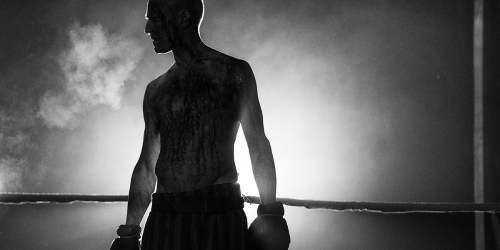
TIFF
MOVIE REVIEW
The Survivor (2021)
Sometimes you have to wonder if there is any story from the Holocaust left untold. And yet the news this week reminds us there are still living Nazis on the run from the justice system; and the photos from the American border of men on horses whipping other men make it bloodily obvious how so many of the choices which led to the Holocaust remain unchanged.
Holocaust stories are always difficult to tell properly onscreen – directors risk either preaching to the converted, or being so hamfisted that it’s a dishonor to the dead. As the Second World War fades from living memory the importance of getting it right is even more vital, which is what makes it so interesting that Barry Levinson has chosen, for his first film on the subject, such a morally ambiguous one. He’s absolutely the right director for this; his speciality has always been morally ambiguous men, whether they’re a bunch of horny creeps in 1950s Baltimore (“Diner”), Robin Williams at war (“Good Morning, Vietnam”), or Bill Murray, Robert De Niro or Al Pacino trying to control the narrative (his work of the past decade). There’s a direct line from all those movies to “The Survivor,” which is based on the appalling true story of a man, Harry Haft (Ben Foster), and how he stayed alive in Auschwitz.
The movie is bookended with Harry in Georgia in the early 1960s, but is largely split between the Auschwitz sequences, which are filmed in black and white, and his new life in 1949 Coney Island, where he’s a two-bit boxer who weaponizes his personal history to score a bout with Rocky Marciano. Harry’s motivation to go up again a fighter who outweighs and outclasses him is to use the publicity to find news of his prewar girlfriend Leah (Dar Zuzovsky) who was arrested in front of him and hasn’t been heard from since. Harry is so convinced she is still alive he has bought the services of one of the networks for finding survivors, staffed by the steadfast Miriam (Vicky Krieps). But as his awful history becomes press fodder, mostly notably through Peter Sarsgaard as a sports journalist, the risk to his boxing training – led by John Leguizamo and Danny DeVito – becomes a serious risk to his life.
Harry learned to box in Auschwitz, when a Nazi officer named Schneider (Billy Magnussen, the current go-to for handsome yet evil bastards) watched with interest when Harry attacked another soldier beating a friend of his for crying over the naked corpse of his wife. Schneider saved Harry’s life because he liked his style, and his rage. As a result he put Harry into a boxing ring every Saturday night, against all comers – generally other prisoners – in a fight to the death.
Mr. Foster is unbelievable in the role. He has always been a mesmerizing actor with a compulsively watchable mix of powder keg physicality and soiled sexuality. In 2014, I saw him in “A Streetcar Named Desire” as Stanley Kowalski, with Gillian Anderson as Blanche and Vanessa Kirby as Stella, and he was utterly perfect with the turn-on-a-dime mix of sex appeal, neediness, menace and self-pity the part requires. Better than Marlon Brando in the movie in one of the best productions of anything I have seen anywhere. His career has always explored men whose hair-trigger ability to explode into violence is a desperate cover for an emotional neediness and ambiguous sexuality they find distasteful. In 2011’s “The Mechanic” he spends the movie in a seductively violent face-off with Jason Statham, of all opponents, and actually nearly wins. It feels like everything Mr. Foster has done has built to this part, and he is flawless.
But Mr. Levinson and cinematographer George Steel made a major mistake in filming the Auschwitz sequences in black and white. Let them say it was to keep the timeline straight all they want. While the emotional distance black and white provides might help make the brutality of the boxing-in-a-concentration-camp scenes watchable, the technique is dangerously alienating; I will go so far to say as inappropriate. Can you imagine if the only sequences in color in “Good Morning, Vietnam” were in the sound studio? When art puts old-timey filters on its difficult stories, it makes it easier for younger audiences to dismiss it as irrelevant to them. That is not what this story deserves.
Mercifully, the movie is not all war. The tenderness with which Harry tiptoes closer to Miriam makes it clear his awful experiences have not broken his humanity. Ms. Krieps, who has quietly become a superstar on a very few English-language roles, is the right counterbalance of quiet understanding and quiet ferocity. She knows what choosing this man will mean and surprises herself by wanting to choose him anyway. Mr. DeVito’s character is a Jewish boxing trainer sneaking over to the other side out of deference to Harry’s past, and also quietly shows how compassion and respect can take many forms. As the movie builds to its resolution, to that reckoning in Georgia, the hope is that the pain and anger will be replaced with understanding and forgiveness everywhere.
A surprising amount of the dialogue is in Yiddish, including a deeply emotional wedding scene where a bride (Svetlana Kundish) sings a Yiddish-language version of “God Bless America.” What America did for its new citizens in the postwar years is almost the polar opposite of what it is doing now. The existence of this movie is its own political point. And in almost all ways, the story receives its due. But let’s hope some of Mr. Levinson’s choices don’t undermine how this upsetting and important movie is received.
Comments